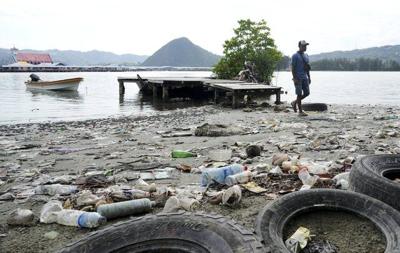OTTAWA - Canadian officials negotiating a global treaty to end plastic pollution at the United Nations say they didn't push other countries to agree to a cap on plastic production because such a measure likely would not be adopted.
The sixth round of talks wrapped up in Geneva Friday without a consensus on a legally-binding international treaty to end plastic waste by 2040. The latest negotiations included 1,400 member delegates from 183 countries, and nearly 1,000 observers from more than 400 organizations.
The negotiations started in 2022 and Canada has been instrumental in bringing countries to the table, having hosted the fourth round of talks in 2024. But countries are at odds now over how far the agreement should go, with many nations opposing caps on plastic production.
Scientists estimate more than 350 million tonnes of plastic are thrown out every year. Less than one-tenth is recycled and more than one-fifth ends up in the environment, where it is harmful to people and other living things.
In a technical briefing Friday, Environment Canada officials said Canada didn't press the idea of a production cap in order to reach consensus on a treaty.
The Canadian delegation sought to address production in a final agreement by focusing instead on sustainable consumption, officials said.
Reuters reported last week that the United States was circulating a memo to other countries urging them to reject any treaty which imposes limits on plastic production and plastic chemical additives.
Canadian officials said Friday they saw no such memo.
Officials said they weren't discouraged by the lack of an agreement after six rounds of negotiations, and hope to press on with another round of talks to hammer out a deal.
Canada did try to push for press for language in the agreement that would affirm the United Nations Declaration on the Rights of Indigenous Peoples.
Following negotiations in South Korea last November, which ended without an agreement, the draft version of the treaty removed references to UNDRIP.
Canada managed to get 45 other countries to back its proposal, but the final draft of the treaty published Friday didn't contain any of the UNDRIP provisions Canada sought to include.
While Environment Canada officials wouldn't elaborate on the negotiating positions of other nations, the department said the lack of UNDRIP language is likely due to the fact that it's not a priority for other countries.
Karen Wirsig, senior program manager for plastics at Environmental Defence Canada, said Canada "showed up strong" to the latest round of negotiations but must now work with allies to make the case for plastic production caps.
"The process established for the Intergovernmental Negotiating Committee has failed and Canada must now work with its allies to keep up the momentum," said Wirsig, who was among the international observers in Geneva.
"At the same time, Canada must pursue domestic policy aligned with the ambition it has shown on the world stage."
Some of the work Canada has done includes banning microbeads in toiletries and tightening standards on plastic produced domestically.
This report by The Canadian Press was first published Aug. 15, 2025.

